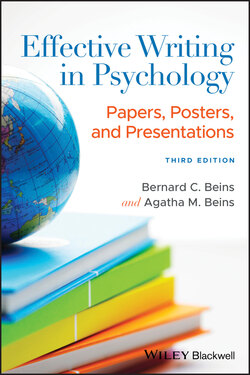Читать книгу Effective Writing in Psychology - Bernard C. Beins - Страница 14
Introduction to Writing in Psychology
ОглавлениеIt would be hard to overstate how important it is to write effectively. Writing constitutes one of the “3 Rs” of a basic education: reading, writing, and 'rithmetic. In the world of business, success is dependent, in part, on effective writing. For high‐level positions, “writing is a ‘threshold skill’ for both employment and promotion” (College Board, 2004 , p. 3). In one survey, many companies noted that writing was important in hiring. One respondent asserted that, “in most cases, writing ability could be your ticket in … or it could be your ticket out” (College Board, 2004 , p. 3). Potential employees who do not write well are unlikely to be hired and, if they are, are unlikely to be promoted.
Graduate school admission may also depend on writing effectiveness. Graduate programs routinely request essays as part of the application process. This writing is “often used to make final selections of students with similar GPAs and standardized test scores. If you are on the borderline of being accepted and the admissions committee could go either way, a sterling essay can increase your chances of success considerably” (American Psychological Association [APA], 2007).
The type of writing that you learn in psychology provides the same skills that will help advance your career. You develop clarity and logic in your ideas, along with a style that will engage the reader. If you create such prose, you will attract the attention of possible employers and graduate school admissions committees, and you will effectively present your ideas in psychology.
Most people find psychology interesting and are eager to learn more about it. But they do not want to fight through dull and meaningless writing. As writers, our biggest hurdle involves turning complex, technical concepts into prose that others can appreciate.
Writing successfully is not easy. It requires knowledge of the topic we are addressing; judicious selection of the best words, phrases, and sentences; and editing and revising what we have composed. If there were a magical formula that we could use to generate good prose, everybody would succeed in communicating even complex and hard‐to‐understand ideas. If you have read the work of scientists, though, you will have discovered that, much of the time, scientific writing is dense and impenetrable. Many writers hide interesting concepts inside packages of dull prose.
On the other hand, people sometimes produce lively prose that may not convey the message accurately. Engaging, but deceptive, prose is no better (and may be worse) than accurate, incomprehensible writing.
Fortunately, there is the desirable middle ground that Sigmund Freud and Williams James occupied, where prose was stimulating, not sleep inducing. Those of us who do not initially fall into this category can learn to communicate effectively. The purpose of this book is to help you find the path to better communication. If you are motivated, you can work on the skills you need to get your point across meaningfully and accurately.
